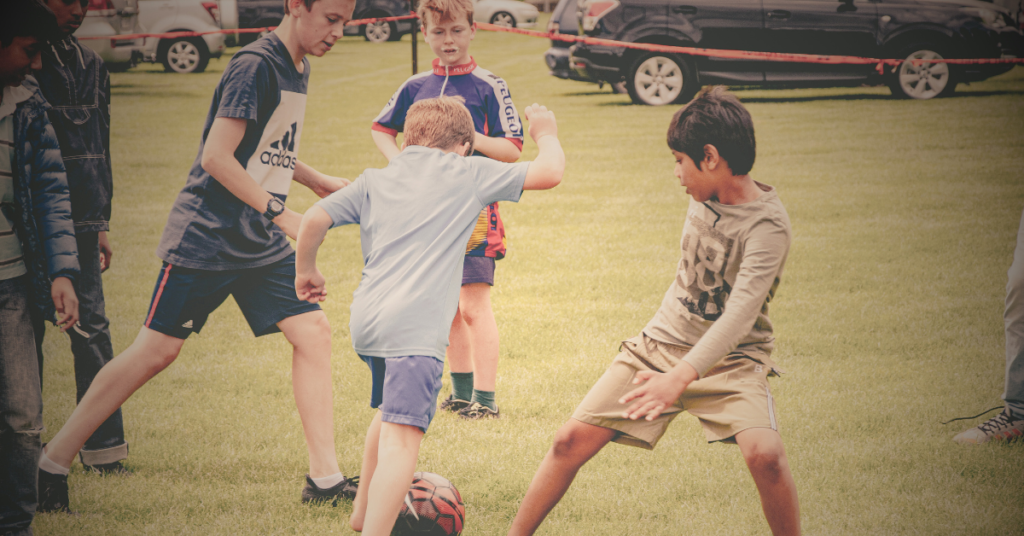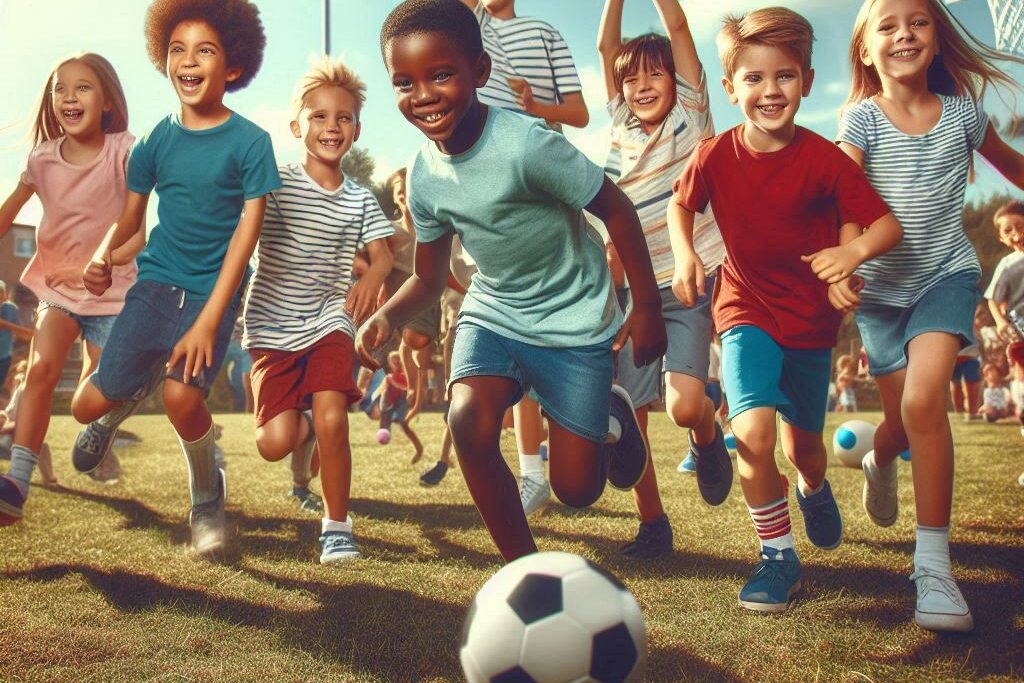Youth sports offer a wealth of opportunities that go beyond the physical activity itself, providing kids with valuable life skills and experiences that shape their development. The 21 top benefits of youth sports for kids include a combination of physical health benefits of youth sports, such as improved fitness, strength, and coordination, as well as mental health benefits that help boost self-esteem and reduce stress. As children engage in sports, they also gain crucial social skills benefits, learning teamwork, communication, and empathy. These experiences foster a sense of building confidence that can carry into other aspects of their lives.
In addition to the obvious physical perks, youth sports play an important role in teaching essential life lessons like discipline and responsibility, as children learn to balance practice, school, and personal commitments. Sports also create opportunities for kids to develop leadership skills, whether they’re captains of a team or supporting their peers. Through sports, kids also learn the importance of goal setting, both in terms of personal achievements and team success, setting them up for success in many areas of their lives, including academics. In fact, the academic benefits of youth sports can extend far beyond the playing field, as kids develop focus, time management, and perseverance—skills that translate to their education.

What Are the Benefits of Youth Sports for Kids?
Sports Foster Confidence and Physical Strength
Sports are more than just a way to burn energy — they’re a powerful tool for building strength and self-confidence. When kids work hard and see the results of their efforts, whether it’s mastering their dribbling skills or winning a game, they develop a sense of accomplishment that carries over into all aspects of their lives. These experiences teach kids that hard work pays off, and the confidence they gain in sports helps them take on new challenges with a positive mindset, both in and outside the game.
Active Kids Perform Better Academically
It turns out that running around and playing sports can actually help kids excel in the classroom. Isn’t this what every parent wants to hear? Physical activity boosts brain function, improving focus and memory — it’s like giving their minds a workout too! Research shows that exercise increases blood flow to the brain, which helps kids think faster, absorb information better, and stay sharp throughout the day. I have a friend whose kids are both in Jiu-jitsu, what i’ve learned is that Jiu-jitsu helps kids think more strategically, similar to chess, by encouraging them to predict their opponent’s moves, plan ahead, and stay flexible, all of which can improve their problem-solving skills and boost their performance in school. So, not only are they getting fitter by participating in sports, but they’re also setting themselves up for academic success.
Sports Enhance Social Skills
Sports provide kids with the perfect environment to develop strong social skills. Both my children are homeschool so we’re always looking for socializing opportunities for them and sports is a great place to start. Whether they’re working as part of a team or simply competing with friends, kids learn how to communicate, collaborate, and handle both success and disappointment. They build meaningful relationships with teammates, coaches, and even opponents, gaining experience in conflict resolution, empathy, and respect — all of which help them navigate social situations both in and outside of sports.

Sports Improve Mental Health
Sports aren’t just good for the body — they’re great for the mind too. Engaging in physical activity triggers the release of endorphins, which are known to boost mood and reduce stress. Regular participation in sports has been shown to lower the risk of anxiety and depression in kids, helping them develop emotional resilience. Even now as a “grown up”, I’ve noticed that if i’m feeling anxious or down, by simply doing something active that involves competition, I start to feel better not only while playing the sport, but also for the hours and days afterwards. The focus required in sports helps children manage their emotions and cope with pressure, contributing to a healthier overall mental state.
Active Kids Lead Healthier Lives
Kids who play sports are more likely to lead an active lifestyle as they grow older. Starting young gives them the tools to create habits around exercise, fitness, and overall wellness that can stick with them for life. The skills they develop early on make it easier to maintain an active routine, setting them up for long-term physical health and well-being — not just as kids, but throughout their adult lives.
Do Kids Who Play Sports Perform Better in Life?
Sports Teach Resilience
Sports teach resilience by showing kids how to pick themselves up after a loss. This lesson translates into other life challenges, like facing setbacks at school or in their careers, helping kids build mental toughness for the future. As parents we want to do all that we can to protect our kids, but sometimes we can overdo it and not let them face hard things. Organized sports are a safe and low-steaks outlet for our kids to face opposition and hardship that helps them build lifelong resilience. Whether it’s overcoming a tough loss or learning from mistakes, sports provide a safe space for children to experience failure and grow stronger from it, preparing them for real-life challenges.
Team Sports Build Leadership Skills
Being part of a team gives kids a chance to develop vital skills like communication, teamwork, and conflict resolution. These lessons in leadership and collaboration are incredibly valuable, helping kids navigate school projects, group activities, and future job settings. Through team sports, children learn to take on leadership roles, support their teammates, and work together toward common goals — skills they can carry with them into almost every area of life.

Sports Help Manage Stress
Sports provide a great way for kids to learn how to handle stress in a healthy way. Whether it’s pushing through a challenging game or staying focused during a tough moment, kids develop resilience and the ability to stay calm under pressure. The routine of something as simple as going outside to shoot a basketball, regular practices, and the physical activity involved help them regulate their emotions, reducing feelings of anxiety or nervousness while building a sense of emotional strength.
Individual Sports Foster Discipline
Even in individual sports, kids learn valuable life lessons that shape their personal growth. While these sports might not rely on teamwork in the traditional sense, they teach kids essential skills like discipline, time management, and self-accountability. Kids involved in individual sports learn to set goals, push themselves to improve, and stay focused on their personal development, building habits that will serve them well in many areas of their life.
Beyond the Field: Life Skills Learned Through Sports
Teamwork and Leadership Are Key Benefits
Team sports are an amazing way for kids to develop teamwork and leadership skills. By communicating effectively, strategizing together, and supporting one another both on and off the field, kids gain real-world experience that they’ll use in many parts of their future. The responsibility they feel toward their teammates and the team’s success teaches them the value of hard work and collaboration, skills that will help them in school, future careers, and even in personal relationships.
Resilience and Perseverance Are Essential
Losing a game can be tough, but it’s also a powerful lesson in resilience and perseverance. Sports show kids how to handle setbacks with grace, pick themselves up, and keep going. This ability to bounce back from failure is crucial in all areas of life, teaching them that mistakes are just part of the process and that each setback is a chance to grow and improve.
Time Management Is a Crucial Skill
Juggling school, practice, and games teaches kids how to manage their time wisely. Learning how to prioritize tasks and stay organized helps them not only succeed in school but also develop habits that will benefit them throughout life. These time management skills, learned through sports, set kids up for success as they get older and face even more responsibilities in college, work, and family life.
Building a Sense of Community
Even in individual sports, kids build strong relationships with coaches and fellow competitors. These connections help create a sense of community, offering support and encouragement as kids grow and take on new challenges. The friendships and camaraderie that come from sports can last a lifetime, providing kids with a solid network of people who will support them through the ups and downs of life.

The Joy of Play: Why Fun and Engagement Matter?
Fun Keeps Kids Engaged in Sports
Sports wouldn’t be what they are without the pure joy and energy they bring to kids’ lives. Fun is the driving force that keeps kids coming back, fueling their passion and motivation to play. The smiles, the laughter, and the excitement during a game — even a casual one — prove just how powerful sports are in creating happiness and unforgettable memories. It’s worth doing whatever we can as parents to keep the game FUN. That excitement for play doesn’t just end on the field; it sparks a lifelong love for staying active, pushing kids to explore new sports and continue moving throughout their lives.
Final Thoughts
Incorporating youth sports into your child’s life offers a wide range of physical, social, and emotional benefits. From building confidence and improving academic performance to teaching important life lessons like resilience and teamwork, the benefits of youth sports are clear. When deciding how to choose the right sport for your child, consider their personality, interests, and physical abilities to ensure a fulfilling experience. As youth sports parents, it’s important to stay involved and supportive, helping your child not only succeed in their chosen sport but also enjoy the journey of personal growth and fun that comes with it.


This is a fantastic post highlighting the many benefits of youth sports! I love how you’ve covered everything from physical and mental health to leadership and resilience. It’s so true that sports provide kids with lifelong skills that go beyond just the game itself.
That said, some kids may feel hesitant to try sports or intimidated by competition. What advice would you give to parents who want to encourage their children without pressuring them? Also, are there certain sports that tend to work especially well for kids who struggle with confidence or social skills?
I’d love to hear thoughts on this—such an important topic for parents!
Thank you for the thoughtful comment! It’s great to hear that the post resonated with you. When it comes to encouraging kids without putting pressure on them, I’d suggest focusing on the fun and enjoyment of the game rather than the outcome. Let them explore different sports and activities, so they can find what they truly enjoy, and praise their efforts, not just their achievements. As for sports that can be especially helpful for building confidence or social skills, I think team sports like soccer or basketball offer a lot of opportunities for social interaction, while individual sports like swimming or tennis can help kids build self-confidence as they track their own progress. Ultimately, it’s about creating a positive and supportive environment where kids feel safe to try new things without fear of failure.
This article brilliantly captures how youth sports are so much more than just physical activity. It’s fascinating to see how playing not only builds strength and coordination but also fosters crucial life skills like teamwork, resilience, and effective time management. What stands out to me is the idea that every game or practice session is a step toward developing a confident and well-rounded individual. How do you think these early experiences in sports shape a child’s approach to challenges later in life?
Thank you so much for your kind words! I’m glad the article resonated with you. I believe that the lessons learned in youth sports have a profound impact on how kids approach challenges later in life. Early experiences teach kids how to handle setbacks, work together with others toward a common goal, and stay disciplined when things get tough. These skills translate directly to real-life situations, helping them face personal, academic, and professional challenges with confidence and resilience. It’s all about building a mindset that views obstacles as opportunities for growth!
Yes, sports teach discipline, perseverance, how to deal with failure, respect for rules and respect for others. These are essential values that accompany them in all aspects of their lives.
Sports are very good for young people’s health. It’s not just about playing, they have a goal, they have to win.
They meet other young people and it keeps them from spending time in front of screens.
Very good content!
Thanks so much for your kind words! ???? I completely agree—sports are about so much more than just playing; they provide valuable life lessons and help shape young people’s character. The social aspect is huge too, allowing them to connect with others while staying active. It’s refreshing to hear others recognize the broader benefits of sports beyond just competition. Appreciate you sharing your thoughts!
Youth sports are an incredible tool for a child’s overall development. Beyond the obvious physical benefits like improved fitness and coordination, they offer valuable life lessons in teamwork, discipline, and perseverance. Engaging in sports helps children build confidence, manage stress, and develop resilience—skills that translate into success both in school and later in life. The social aspects of sports are equally important, as kids learn communication, leadership, and collaboration, setting them up for future personal and professional relationships. Furthermore, regular physical activity has been linked to better academic performance, as exercise enhances focus and cognitive function. Whether it’s through team sports or individual competition, kids gain a sense of responsibility and goal-setting abilities that stay with them for life. Encouraging children to participate in sports is one of the best ways to support their growth, health, and happiness.
I couldn’t agree more! Youth sports offer so much more than just physical fitness—they help shape kids into well-rounded individuals. I love how you highlighted the impact on confidence, stress management, and resilience. Those life lessons go far beyond the field or court and truly prepare kids for success in every area of life.
The connection between physical activity and academic performance is such an important point, too. It’s amazing how movement fuels focus and cognitive function! Sports really do provide a powerful foundation for kids’ growth, health, and happiness. Thanks for sharing such a well-rounded perspective!
The blog does a fantastic job of highlighting the numerous benefits of youth sports, from physical fitness to crucial life skills like teamwork, resilience, and time management. I especially liked the emphasis on how sports can shape a child’s confidence and academic performance. It’s amazing how physical activity can positively impact so many aspects of life. As a parent, I also appreciate the focus on making sports fun, since keeping kids engaged is key to long-term participation. One thing I wonder is how we can ensure that youth sports remain inclusive and accessible to all kids, regardless of their background or financial situation. What are some effective ways to address these barriers?
Thank you so much for your thoughtful comment! I’m really glad you connected with the points about confidence, academics, and, most importantly, keeping sports fun for kids. You’re absolutely right—ensuring that youth sports are inclusive and accessible to all kids is crucial.
There are a few effective ways to break down barriers:
???? Community-Based Programs – Many cities offer free or low-cost sports programs through local parks and rec departments. Nonprofits like Every Kid Sports also provide grants to help cover registration fees.
⚾ Equipment Swaps & Scholarships – Teams and leagues can organize gear exchanges to help families access quality equipment without the financial burden. Many leagues also offer scholarships for families in need.
???? Sponsorships & Local Support – Small businesses and community organizations often love sponsoring youth teams. This can help reduce costs for families and keep participation fees manageable.
???? Flexible Scheduling & Alternative Leagues – Sometimes, kids miss out due to transportation or time constraints. More leagues are exploring flexible practice schedules and non-traditional formats (like weekend-only leagues) to make it easier for families to participate.
It’s definitely a team effort to make sports accessible for all kids, but when communities come together, it makes a huge difference! Thanks again for reading and sharing your perspective!